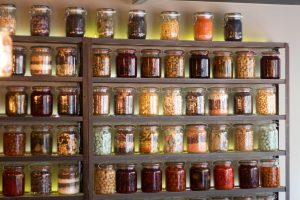I received a pre-release copy of a book on feeding children last week. I read through it and enjoyed it. Most of it contained information I had already read in the many books and websites I had read on traditional foods. Some of it was new information or things I might reference again and again in the raising of my children.
But, to be honest, even after years of reading all of these things I’m the constant skeptic. Even if it absolutely makes sense in terms of how people have successfully fed their children for thousands of years with good health and before the onslaught of degenerative diseases I… I just have a hard time believing something based on word alone.
But then the other night we were eating supper, the five of us crammed around a tiny table. I offered up meat, corn bread with butter or sour cream, and green vegetables. Our oldest two sons – 6 & 4 – ate a plate full of all of the above as did my husband and I. Our one year old daughter tasted everything but as she continued to eat for calories and nourishment she began to reject everything except one combination:
meat topped with either butter or sour cream
And a flood of all of the many sentences I have read over the years on how babies need meat, saturated fat, and nutrient density ran through my head. Of course, since reading the first of those sentences I have fed our boys liberal amounts of saturated fat and meat from pastured and organic animals.
But that one meal really drove home to me how and why to feed children: exactly what you’re eating with an emphasis on nutrient density and meat and fat (from good sources, if possible).
How this plays out is different from meal to meal, but a general idea looks like this:
- Breakfast usually includes eggs – either from our own chickens or a neighbor’s – cooked in lard or butter, along with something more filling like potatoes, fruit, or (usually) soured grains. I usually start by feeding them the eggs (and bacon or sausage if we have it) and if they’re still hungry then move into the “filling” foods.
- Lunch is usually something quicker and often of the Mexican-inspired variety. A pot of beans topped with a little meat, cheese, sour cream, cultured vegetable, etc. might be offered and if I think there’s not enough beans and veggies to fill them up along with the fat/meat I will cook up a simple pot of rice.
- Supper is usually more involved in that I’ll make a pot of something that involves a lot of vegetable chopping. If it is an all vegetable meal (which we eat from time to time) I put bacon in the collard greens, a cultured dairy dressing on the salad, and plenty of butter on the sweet potatoes. If there is meat then I always try to balance it with a salad and hopefully another vegetable, always dressed in some type of fat.
At all of these meals I try to emphasize the nutrient-dense, brain-building foods first. At the top of this list (for us) are:
- Eggs
- Raw and cultured dairy
- Meat and organs (when we can get them)
- Animal and other saturated fats like butter, lard, coconut oil, tallow, cream, etc.
- All vegetables usually served with a fat, and especially cultured vegetables.
And when these foods have been consumed we bring in the fillers like potatoes and breads. That isn’t to say we don’t eat a bowl of porridge, I just try to make sure they’re also getting plenty of butter and a pastured egg to go with it.
I have seen mothers easily go down the path of short order cook or obsessively preparing a very specific type of meal for their child and then a whole other type of meal for themselves. Perhaps it is my constant obsession with sustainability, but I just can’t imagine that one could maintain that, along with their sanity, for very long.
So I try to make food preparation a priority, which is greatly helped by meal planning, and always emphasize nutrient-density before filling, though these are often one in the same.
And, though I’m a skeptic at heart, it does comfort me to know that this is how women fed their children for thousands of years.








